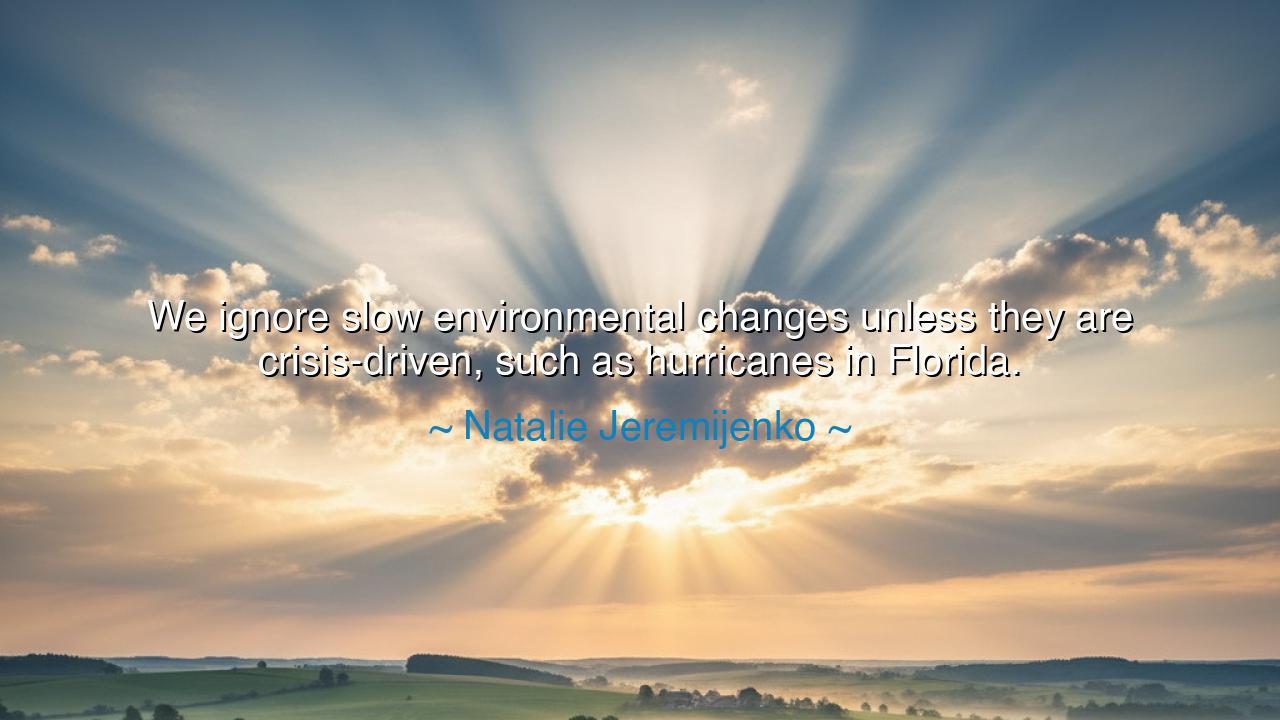
We ignore slow environmental changes unless they are
We ignore slow environmental changes unless they are crisis-driven, such as hurricanes in Florida.






Hear the words of Natalie Jeremijenko, spoken as a warning and a lament: “We ignore slow environmental changes unless they are crisis-driven, such as hurricanes in Florida.” In this simple utterance lies a deep reflection on human nature itself. For mankind, eager to respond to fire and flood, too often closes its eyes to the quiet erosion of soil, the gradual warming of seas, the silent vanishing of species. We live as though only the storm deserves our attention, while the creeping decay of years passes unseen until it bursts forth as catastrophe.
To say we ignore slow changes is to remind us that time itself can be an enemy when we are careless. The river does not flood in a day, but swells year by year as forests are cut and wetlands drained. The air does not choke in a moment, but gathers poison as cities grow and laws grow lax. Yet men wait until the winds howl and the waters rise before they stir from their slumber. Jeremijenko’s words awaken us to this folly: it is not the sudden hurricane alone that imperils us, but the decades of neglect that make the storm’s fury unbearable.
History bears witness to this truth. Consider the tale of the Dust Bowl in America during the 1930s. For years farmers plowed without care, stripping the land of its grasses, ignoring the slow warnings of soil degradation. At first, the danger seemed invisible. Then came the drought, and the winds lifted the barren earth into the sky. Only when black blizzards swept across the plains, blotting out the sun, did the nation cry out in fear. But the crisis had been building for decades, unnoticed and unheeded. Jeremijenko’s warning is the same: do not wait for the crisis before you act, for by then the price is tenfold.
The ancients understood this wisdom in their way. They honored the cycles of the seasons, knowing that neglecting the sowing or abusing the soil would bring famine in years to come. They read the signs of the earth—the cracks in the ground, the patterns of birds, the shifting of tides—and knew that small changes foretold greater trials. But modern man, distracted by speed and noise, has lost this patient watchfulness. He waits for the thunderbolt to awaken him, though the whispers of the earth have long been calling.
The meaning of Jeremijenko’s words is therefore both a warning and a command. If we do not heed slow environmental changes, we shall always be slaves to crisis-driven responses. We shall rebuild after each hurricane, yet never question why the seas grow higher. We shall mourn after each wildfire, yet never ask why the forests are drier than before. True wisdom does not wait for disaster—it anticipates it, prevents it, and acts while the change is still within human hands to guide.
The lesson for future generations is clear: cultivate the discipline of vigilance. Do not dismiss small signs of decline in your world, in your community, even in your own life. If the air seems thicker, if the river runs lower, if the seasons grow strange—act then, not later. Do not let convenience lull you into blindness, for the earth’s whispers today are tomorrow’s storms.
Therefore, let each one take up this practice. Watch the patterns of your land and city. Support leaders who care not only for sudden crises, but for long-term stewardship. Reduce the harm you cause not because disaster has struck, but because foresight is nobler than regret. For to live wisely is to act before compulsion, to heal before the wound festers, to guard before the enemy breaches the gate.
So remember Jeremijenko’s words: “We ignore slow environmental changes unless they are crisis-driven.” Let them be a shield against forgetfulness. Let them stir you to action even in quiet days when no storm is near. For the wise do not wait for the hurricane; they prepare while the sky is still calm, and in so doing, they save both themselves and generations yet unborn.






AAdministratorAdministrator
Welcome, honored guests. Please leave a comment, we will respond soon